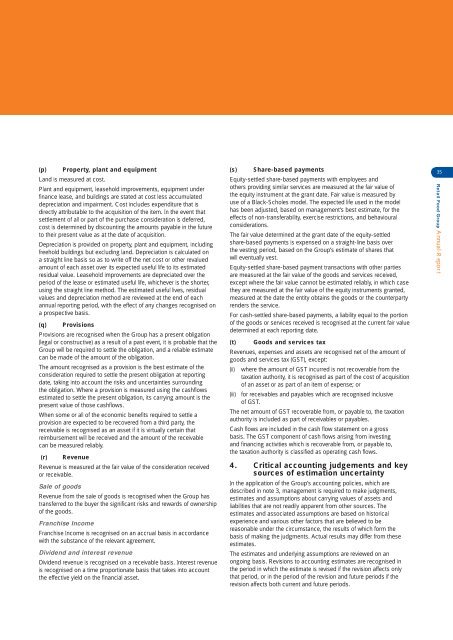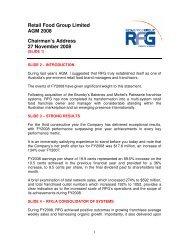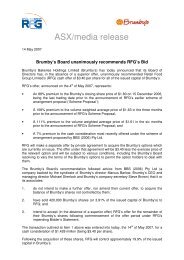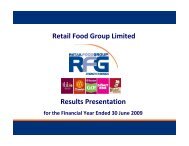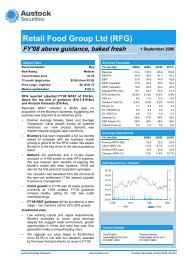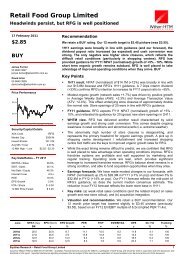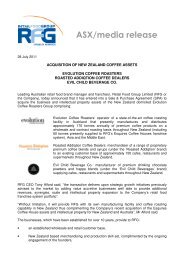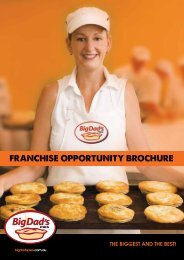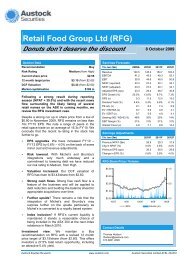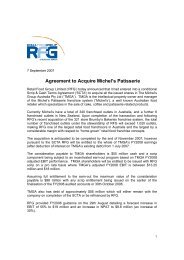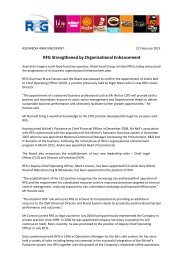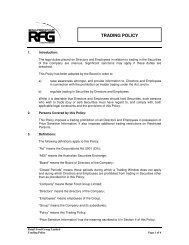RFG Annual Report 2007 - Retail Food Group
RFG Annual Report 2007 - Retail Food Group
RFG Annual Report 2007 - Retail Food Group
Create successful ePaper yourself
Turn your PDF publications into a flip-book with our unique Google optimized e-Paper software.
(p) Property, plant and equipment<br />
Land is measured at cost.<br />
Plant and equipment, leasehold improvements, equipment under<br />
fi nance lease, and buildings are stated at cost less accumulated<br />
depreciation and impairment. Cost includes expenditure that is<br />
directly attributable to the acquisition of the item. In the event that<br />
settlement of all or part of the purchase consideration is deferred,<br />
cost is determined by discounting the amounts payable in the future<br />
to their present value as at the date of acquisition.<br />
Depreciation is provided on property, plant and equipment, including<br />
freehold buildings but excluding land. Depreciation is calculated on<br />
a straight line basis so as to write off the net cost or other revalued<br />
amount of each asset over its expected useful life to its estimated<br />
residual value. Leasehold improvements are depreciated over the<br />
period of the lease or estimated useful life, whichever is the shorter,<br />
using the straight line method. The estimated useful lives, residual<br />
values and depreciation method are reviewed at the end of each<br />
annual reporting period, with the effect of any changes recognised on<br />
a prospective basis.<br />
(q) Provisions<br />
Provisions are recognised when the <strong>Group</strong> has a present obligation<br />
(legal or constructive) as a result of a past event, it is probable that the<br />
<strong>Group</strong> will be required to settle the obligation, and a reliable estimate<br />
can be made of the amount of the obligation.<br />
The amount recognised as a provision is the best estimate of the<br />
consideration required to settle the present obligation at reporting<br />
date, taking into account the risks and uncertainties surrounding<br />
the obligation. Where a provision is measured using the cashfl ows<br />
estimated to settle the present obligation, its carrying amount is the<br />
present value of those cashfl ows.<br />
When some or all of the economic benefi ts required to settle a<br />
provision are expected to be recovered from a third party, the<br />
receivable is recognised as an asset if it is virtually certain that<br />
reimbursement will be received and the amount of the receivable<br />
can be measured reliably.<br />
(r) Revenue<br />
Revenue is measured at the fair value of the consideration received<br />
or receivable.<br />
Sale of goods<br />
Revenue from the sale of goods is recognised when the <strong>Group</strong> has<br />
transferred to the buyer the signifi cant risks and rewards of ownership<br />
of the goods.<br />
Franchise Income<br />
Franchise Income is recognised on an accrual basis in accordance<br />
with the substance of the relevant agreement.<br />
Dividend and interest revenue<br />
Dividend revenue is recognised on a receivable basis. Interest revenue<br />
is recognised on a time proportionate basis that takes into account<br />
the effective yield on the fi nancial asset.<br />
(s) Share-based payments<br />
Equity-settled share-based payments with employees and<br />
others providing similar services are measured at the fair value of<br />
the equity instrument at the grant date. Fair value is measured by<br />
use of a Black-Scholes model. The expected life used in the model<br />
has been adjusted, based on management’s best estimate, for the<br />
effects of non-transferability, exercise restrictions, and behavioural<br />
considerations.<br />
The fair value determined at the grant date of the equity-settled<br />
share-based payments is expensed on a straight-line basis over<br />
the vesting period, based on the <strong>Group</strong>’s estimate of shares that<br />
will eventually vest.<br />
Equity-settled share-based payment transactions with other parties<br />
are measured at the fair value of the goods and services received,<br />
except where the fair value cannot be estimated reliably, in which case<br />
they are measured at the fair value of the equity instruments granted,<br />
measured at the date the entity obtains the goods or the counterparty<br />
renders the service.<br />
For cash-settled share-based payments, a liability equal to the portion<br />
of the goods or services received is recognised at the current fair value<br />
determined at each reporting date.<br />
(t) Goods and services tax<br />
Revenues, expenses and assets are recognised net of the amount of<br />
goods and services tax (GST), except:<br />
(ii) where the amount of GST incurred is not recoverable from the<br />
taxation authority, it is recognised as part of the cost of acquisition<br />
of an asset or as part of an item of expense; or<br />
(iii) for receivables and payables which are recognised inclusive<br />
of GST.<br />
The net amount of GST recoverable from, or payable to, the taxation<br />
authority is included as part of receivables or payables.<br />
Cash fl ows are included in the cash fl ow statement on a gross<br />
basis. The GST component of cash fl ows arising from investing<br />
and fi nancing activities which is recoverable from, or payable to,<br />
the taxation authority is classifi ed as operating cash fl ows.<br />
4. Critical accounting judgements and key<br />
sources of estimation uncertainty<br />
In the application of the <strong>Group</strong>’s accounting policies, which are<br />
described in note 3, management is required to make judgments,<br />
estimates and assumptions about carrying values of assets and<br />
liabilities that are not readily apparent from other sources. The<br />
estimates and associated assumptions are based on historical<br />
experience and various other factors that are believed to be<br />
reasonable under the circumstance, the results of which form the<br />
basis of making the judgments. Actual results may differ from these<br />
estimates.<br />
The estimates and underlying assumptions are reviewed on an<br />
ongoing basis. Revisions to accounting estimates are recognised in<br />
the period in which the estimate is revised if the revision affects only<br />
that period, or in the period of the revision and future periods if the<br />
revision affects both current and future periods.<br />
35<br />
<strong>Retail</strong> <strong>Food</strong> <strong>Group</strong> <strong>Annual</strong> <strong>Report</strong>


